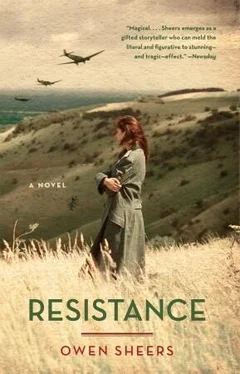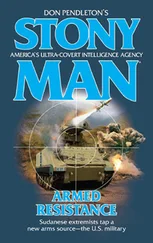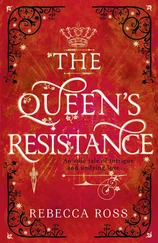Albrecht paced back and forth before the range in the front room of The Court, the heel of his boots scuffing over the flagstones. Atkins sat in a chair with Alex standing behind him pressing the muzzle of his gun into his neck. A bruise was deepening under the sergeant’s eye where Atkins’s boot had caught him. Albrecht kept his hands in his pockets because they were shaking. With rage, with fear, with sadness.
He hated this Englishman sitting before him, his head bowed, his hair matted and stinking. Not because he was English. Not because of those defiant, hard blue eyes. Not even because he was his enemy, but simply because he had come here from there. He had brought the war back into the valley and so had also brought with him the choices Albrecht so hated and the parts of himself he so wanted to forget.
Albrecht stopped pacing and looked down at Atkins. The man was obviously British Intelligence, otherwise he’d no longer be alive. He bore the marks of the Gestapo all over him; those denuded, bloodied fingers. He must have something they wanted, otherwise they would have shot him by now. He must have held out, somehow. That was why he was still alive and still here. So it was no use questioning him further. If he’d stuck out the Gestapo’s interrogation then anything Albrecht might try would be child’s play in comparison.
He went and sat at the table, his head in his hands. The dark wood of its surface was stained with even darker pools, worn smooth in little hollows where generations of men had placed their elbows. The table was a map of all the humanity who had lived in this house. Of all those who had nurtured food from these bare hills and sat here to eat the fruits of their labours. Men who had given to the soil, but only to take. This was the equation here, he saw that now. This was the pattern by which these farm women lived. The cycle of husbandry and farming was a simple one. Give life and take life, so there may be life once more.
Albrecht sighed, feeling the weight of his own head in his palms. “Take him away,” he said to Alex without looking up from the table. “Get rid of him. Quietly.”

Albrecht watched as Sarah dressed the orphan lamb in the flayed skin of another. Just moments before he’d observed her with equal fascination as she’d run the blade of her knife about the dead lamb’s neck, hooves, and rump, then peeled the skin from its body, drawing it over its head like a jumper.
“You’d best bury that one,” she’d said to him as she turned the skin back the right way round, her small hands as bloodied as a butcher’s. Albrecht took the raw body, mottled with globules of fat, wearing its head like a mask, and dug a shallow grave down beside the river. When he returned Sarah was still preparing the orphan lamb, slipping its legs through those of the skin jacket. She pulled the new coat tight over its back, making sure it covered the tail where the ewe would smell to recognise her own offspring. Brushing a strand of hair from her eye and tipping back on her haunches, she inspected her work. The skin still hung loose about the lamb’s midriff.
“I’ll need some string,” she said. “Hold it for a second, will you?”
Albrecht knelt beside her. There was a pale pink smear of blood across her temple where she’d smoothed back her hair. He wanted to lick his finger, press it to her temple and rub the mark away, but he just took the lamb instead, holding it with both his hands, his fingers touching under its belly. He could feel its skin beneath the adopted coat, supple over the bone, its ribs, thin as twigs, and the rapid tremor of its heart beneath its ribs again. A cloud passed from over the sun and a quick tide of light slid down the valley, over the farmhouse, the two waterfalls on either side, and then across the lower field where Sarah was walking away from him towards her coat, hooked over the gatepost like the body of a hanging man. Without that coat he could make out her shape more clearly. She wore a cardigan over a blouse tied at her waist, which was narrower than he’d expected. From this distance it looked as if his hands would encompass it completely, as easily as they did the body of this lamb.
The tide of light reached him, bringing with it a warmth that had seemed impossible all through that long winter. Such light was a rare gift in this valley, he’d come to appreciate this now. A cloud passing, or the sun rising over the Black Hill could transfigure the landscape in seconds; from a dark notch of earth and broken stone into a gilded wound, as if the mountains had been scratched and revealed to be pure gold beneath.
The lamb moved under his hands, lithe and fragile, just hours old, its dark eyes still filling with light. If there had ever been any rhetoric of National Socialism that struck a faint note in him, Albrecht thought, then perhaps it had been this. The idealism of the simple, rural life, a celebration of the German peasantry and their values. He’d lived his life in cities and towns but this lamb, its delicate heart, the borrowed skin, the sudden sun, the waterfalls that never stopped; all of it countered the years of war behind him and made him feel whole again. It also made him feel younger, a child once more; ignorant but learning, edging his way towards a knowledge that seemed more elemental, more connected than anything he’d ever studied in the libraries of Dresden or Oxford.
Sarah returned with a ball of string from which she cut a length to tie the skinned coat about the lamb’s stomach.
“What if this doesn’t work?” Albrecht asked.
“Use the dogs, I s’pose,” Sarah said, pulling the skin tight over the lamb’s rump.
As ever, her speech was sparse, but Albrecht had come to understand that for every word spoken there were another ten shadowing it, unsaid within her. The words she did speak were like stones dropped into a well to determine its depth. Few, but resonant beyond their own sound.
Checking the tightness of the string Sarah took the lamb from Albrecht and let it into the pen where the surrogate ewe was already grazing. Together, they leant on the top rail of the hurdle fence and watched.
Ever since Albrecht had shown Sarah the map a month ago she’d engaged with him and the rest of the patrol more in the manner of the other women in the valley. Still infrequently, still guarded, but in a pragmatic spirit of circumstance; as fellow subjects of events and not as occupier and occupied. She’d even allowed him to visit her with the gramophone again, and play her some of Bach’s other cello suites.
Sarah had agreed not to mention the map to the other women. At first, when she’d said this to Albrecht as they walked back from the Red Darren that day, she thought she’d still have to tell Maggie. But then she’d found she hadn’t wanted to. Maggie’s air of privileged knowledge whenever she spoke with Albrecht, her taking matters into her own hands, had irritated Sarah. She felt she had no reason to share the existence of the map with her, that somehow Maggie didn’t deserve such confidence. So she’d kept her promise to Albrecht and over the weeks it had worked upon her. There was nothing she could do about it. The shared knowledge of the map created something of an understanding between them. She felt this most when they were with others. Nothing was said, but the experience was there, shadowing them. The flakes of gold leaf, the faded towers of the cities, the once blue veins of the rivers. Albrecht’s silent witness confirmed her own. It made her feel, for the first time in months, in control of something.
Читать дальше













